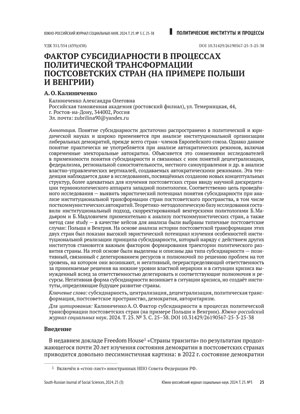Abstract
The concept of subsidiarity is quite common in political and legal sciences and is widely used in the analysis of the institutional organization of liberal democracies, primarily the member countries of the European Union. However, this concept is practically not used when analyzing autocratic regimes, including modern “electoral autocracies.” This is explained by the doubts of researchers about the applicability of the concept of subsidiarity and the related concepts of decentralization, federalism, regional independence, local self-government, etc. in the analysis of power and management verticals created by autocratic regimes. This trend is observed even in studies devoted to the creation of new conceptual structures that are more adequate for the study of post-Soviet countries due to the scientific discrediting of the terminological apparatus of Western political science. Accordingly, the purpose of the study was to identify the heuristic potential of the concept of subsidiarity when analyzing the institutional transformation of the countries of the post-Soviet space, including post-communist autocracies. The theoretical and methodological basis of the study was the institutional approach, adjusted by the Hungarian political scientists B. Magyar and B. Madlovic in relation to the analysis of post-communist countries, as well as the case study method — typical post-Soviet cases were chosen as cases for analysis: Poland, Hungary and Romania. Based on the analysis of the history of the post-Soviet transformation of these three countries, a high heuristic potential was shown for studying the features of the institutional implementation of the principle of subsidiarity, which, along with the action of other institutions, becomes an important factor in shaping the trajectory of the country’s political development. On this basis, two types of subsidiarity were identified and described — “positive”, associated with the delegation of resources and authority to solve problems to the level at which they arise; and “negative”, which redistributes responsibility for decisions made to the lower levels of the power hierarchy, and in a crisis situation is forced, along with responsibility, to delegate corresponding powers and resources. The “negative” form of subsidiarity arises in a situation of crisis, but creates institutions that determine the future development of the country.
Keywords
References
Арендт, Х. (1996). Истоки тоталитаризма. Москва: ЦентрКом.
Артеев, С.П. (2022). COVID-субсидиарность как новый политический феномен. Вестник МГИМО-Университета, 15(1), 111–125.
Выдрин, И.В., Эмих, В.В. (2017). Принцип субсидиарности в организации местного самоуправления в России и Польше. Научный ежегодник Института философии и права Уральского отделения РАН, 17(2), 71–99.
Голосов, Г.В., Лихтенштейн, А.В. (2001). «Партии власти» и российский институциональный дизайн: теоретический анализ. Полис. Политические исследования, 1, 6–14.
Зелиньски, Я. (2013). Местная участвующая (participatory) демократия в Польше. Юридическая наука, 4, 115–121.
Ирхин, И.В. (2021). Европейская модель принципа субсидиарности: публично-правовое исследование: монография. Москва: Проспект.
Кирдина, С.Г. (2001). Институциональные матрицы и развитие России. Новосибирск: ИЭиОПП СО РАН.
Константинов, М.С. (2005). Элементы институционально-эволюционной теории в социальной философии М.К. Петрова. Ростов-на-Дону: Издательство РГПУ.
Леденёва, А.В. (2022). Предисловие. В Б. Мадьяр, Б. Мадлович Посткоммунистические режимы. Концептуальная структура. Том I. (с. 9–18). Москва: Новое литературное обозрение.
Мадьяр, Б. (2016). Анатомия посткоммунистического мафиозного государства. На примере Венгрии. Москва: Новое литературное обозрение.
Мадьяр, Б., Мадлович, Б. (2022). Посткоммунистические режимы. Концептуальная структура. Том 1. Москва: Новое литературное обозрение.
Мельвиль, А.Ю. (2020). Выйти из «гетто»: о вкладе постсоветских исследований/Russian Studies в современную политическую науку. Полис. Политические исследования, 1, 22–43.
Норт, Д., Уоллис, Дж., Вайнгаст, Б. (2011). Насилие и социальные порядки. Концептуальные рамки для интерпретации письменной истории человечества. Москва: Издательство Института Гайдара.
Панов, П.В. (2004). Теории политических институтов. Пермь: Пушка.
Пименова, О.И. (2015). Субсидиарность как принцип реализации совместных законодательных полномочий: опыт Европейского союза и перспективы его адаптации в российской системе разграничения полномочий по предметам совместного ведения. Москва: Новое время.
Пименова, О.И. (2017). Субсидиарность как нравственная, философская и правовая категория. Актуальные проблемы российского права, 11(84), 37–47.
Пименова, О.И. (2019). Принцип субсидиарности в Европейском союзе: перипетии применения. Право. Журнал Высшей школы экономики, 4, 144–163.
Хантингтон, С. (2003). Третья волна. Демократизация в конце XX века. Москва: Российская политическая энциклопедия (РОССПЭН).
Харитонова, О.Г. (2013). Католицизм и современность: демократия в социальной доктрине Римско-катологической церкви. Политическая наука, 2, 81–99.
Wolman, H. et. al. (2008). Comparing Local Government Autonomy Across States. In Proceedings: Annual Conference on Taxation and Minutes of the Annual Meeting of the National Tax Association (pp. 377–383).

